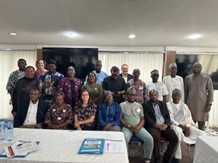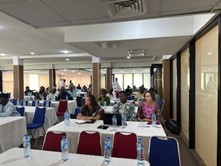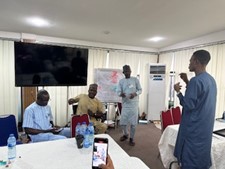
PSEG Launch: Empowering Stakeholders for Policy-Driven Agricultural Growth in Nigeria
DOWNLOADNovember 1, 2024 - Austin Witt
The Policy Support for Economic Growth (PSEG) initiative officially launched with a high-impact stakeholder consultation forum on September 5-6, 2024, at the Destination Hotel in Abuja. This five-year associate award, under the Policy Research, Capacity, and Influence (PRCI) program, is a collaborative endeavor led by Michigan State University (MSU), with support from the International Food Policy Research Institute (IFPRI) and funding from USAID. The event brought together representatives from six key states—Kaduna, Kano, Sokoto, Zamfara, Nasarawa, and Plateau—as well as federal ministries, civil society organizations, academic institutions, and private sector partners.
The forum began with opening prayers, setting an inclusive tone that was echoed throughout the event. Distinguished speakers, including Prof. David Tschirley (via video), Dr. Malik Haidara, and Hon. Aminu Adefisayo Tajudeen, emphasized the importance of building institutional capacities for evidence-based, impactful policy-making. University Foundation Professor Saweda Liverpool-Tasie, in her keynote, underscored the significance of data-driven strategies to address pressing agricultural challenges, stressing local ownership and equitable partnerships as core values of PSEG.
Key discussions delved into critical issues affecting the agricultural sector, including the inadequate use of modern technology, gender inclusivity gaps, and the urgent need for climate adaptation strategies. The event featured presentations from state representatives, each outlining unique agricultural strengths and challenges. For example, Plateau State highlighted its extensive potato farming and the need for advanced cold storage facilities, while Kaduna State emphasized the role of ginger production and advocated for farmer insurance schemes to mitigate risks.
Ibrahim Mohammed from the Federal Ministry of Agriculture and Food Security presented on the Nigeria Agricultural Technology and Innovation Policy (NATIP), detailing efforts in synergy, livestock development, and the push for better mechanization. Despite progress, challenges remain, such as limited resources, knowledge gaps in soil management, and insufficient extension services. Participants emphasized the need for enhanced policy coordination and stronger linkages between research and practical implementation.
The PSEG Scholars' Program, another highlight of the launch, aims to equip young Nigerians with skills in policy research and advocacy, promoting sustainable economic growth and resilience. This initiative aligns with PSEG’s broader goal of supporting inclusive, data-informed decision-making to benefit Nigeria’s agricultural landscape.
Interactive sessions over the two days identified training needs and practical solutions. Discussions addressed climate change mitigation, agricultural export challenges, and the necessity of engaging farmer groups and people with disabilities. Proposed actions included advocating for improved irrigation systems, establishing export hubs, and strengthening community engagement.
The event concluded with a reflection on the collaborative achievements and future ambitions of PSEG. Prof. Liverpool-Tasie’s closing remarks encapsulated the forum's energy, highlighting the slogan, “PSEG na mu ne” (PSEG is for all of us), emphasizing shared responsibility in advancing Nigeria’s agricultural and economic future.






 Print
Print Email
Email